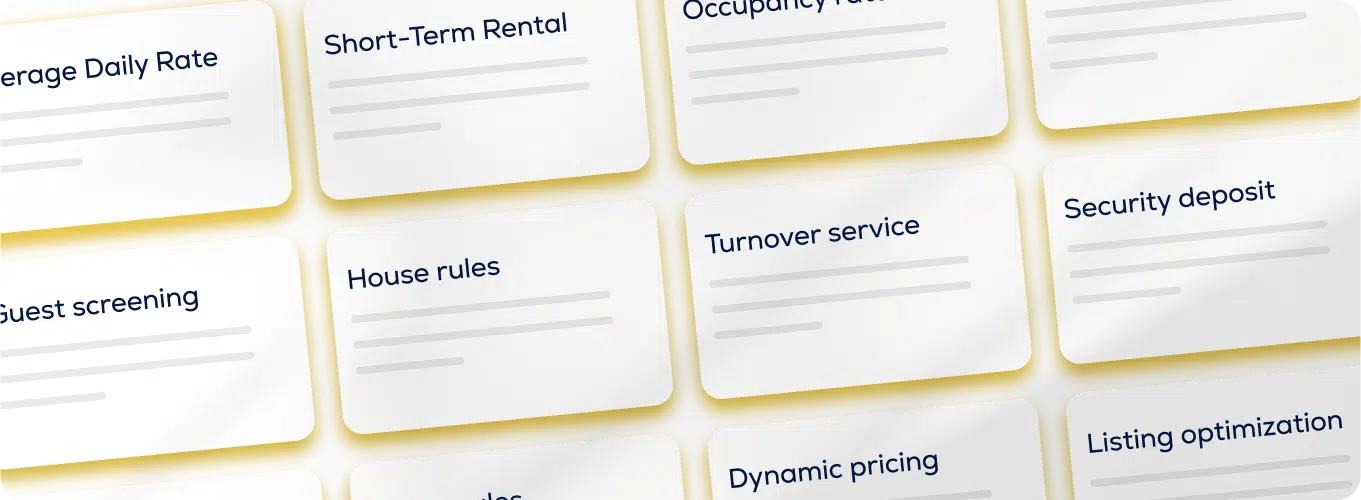Short-term rentals have become increasingly popular, offering property owners a flexible and potentially lucrative way to earn income. As a host, understanding the key terms and concepts related to short-term rentals is crucial for success. In this list of common terms, we cover all of the essential phrases every host should be familiar with when they work in property management.

1. Short-Term Rental (STR)
This refers to the rental of a property or part of it for a short period, typically less than 30 days. It can include entire homes, apartments, or just a room.
2. Airbnb, VRBO, and other property management and rental platforms
These are online marketplaces where hosts can list their properties for rent. Each platform has its unique rules, fees, and audience, which is why it’s a good idea to use a vacation rental management software like Guesty. It lets you list your property on multiple platforms and manage it all in one place.
3. Occupancy rate
This is the percentage of time your rental is booked compared to the available time. A higher occupancy rate often means higher profitability, so this is a good goal to aim for with your STR strategy.
4. Average Daily Rate (ADR)
ADR is the average rental income per rented day. It helps hosts like you evaluate their pricing strategy and decide if you’re earning enough from your property, or if you’ve it priced too high.
5. Revenue management
This involves strategies to maximize income, such as adjusting prices based on demand, season, or local events. Guesty’s blog offers many great insights and ideas for revenue management.
6. Guest screening
The process of reviewing potential guests before accepting bookings. This can include checking reviews from previous hosts, verifying identity, and ensuring they understand your house rules.
7. House rules
These are guidelines set by the host for guests. Common rules include no smoking, no pets, or noise curfews.
8. Minimum stay requirements
This term refers to the minimum number of nights a guest must book. Hosts use this to reduce turnover costs or comply with local regulations.

9. Turnover service
This service involves cleaning and preparing the property between guests. It can be done by the host or through a professional service.
10. Security deposit
A security deposit is an amount held to cover potential damages caused by guests. It’s typically refunded if there are no damages.
11. Dynamic pricing
This pricing strategy involves adjusting rates based on real-time market demand, seasonality, and local events.
12. Listing optimization
This involves enhancing your rental listing with high-quality photos, detailed descriptions, and updated availability to attract more bookings.
13. Superhost status
Platforms like Airbnb have recognition programs for hosts who provide exceptional service, like high response rates and excellent guest reviews.
14. Booking channels
These are various platforms or methods guests use to book your rental, such as direct booking through a personal website or through third-party platforms.
15. Instant book
This feature allows guests to book your property without prior approval from the host, speeding up the booking process.
16. Occupancy laws and regulations
These laws govern the use of properties for short-term rentals. They can include limits on the number of days a property can be rented and zoning regulations.

17. Insurance
Specialized insurance for short-term rentals covers risks like property damage and liability, which traditional homeowner’s insurance might not cover.
18. Cleaning fees
These are fees charged to the guest to cover the cost of cleaning the property after their stay.
19. Cancellation policy
This outlines the conditions under which guests can cancel their booking and whether they’re eligible for a refund.
20. Property management software
This software helps hosts manage bookings, communication, pricing, and other aspects of rental management. Guesty is one of the best vacation rental management softwares currently available to hosts like you.
21. Local hospitality taxes
These are taxes that hosts may need to collect and remit, similar to hotel taxes, depending on local laws.
22. Check-in/Check-out procedures
These procedures outline how guests will access the property and the expected conditions upon departure.
23. Guest reviews and ratings
Feedback from guests that can influence the attractiveness of your listing to future potential guests.

24. Amenities
Features that enhance guest comfort, such as Wi-Fi, laundry facilities, or a fully equipped kitchen.
25. Vacation rental agreement
A legal document outlining the terms and conditions between the host and the guest, including rental period, payment, and house rules.
Why these property management terms matter
Understanding these phrases is the first step in becoming a successful short-term rental host. By mastering these concepts, you can more effectively manage your properties, provide excellent guest experiences, and optimize your rental income. Remember, the short-term rental market is dynamic, and staying informed about trends and regulatory changes is key to long-term success.




